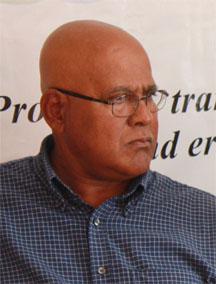Former Auditor General Anand Goolsarran has said that the Global Witness report on Guyana has confirmed that the 2016 deal with ExxonMobil is overwhelmingly in its favour and should be renegotiated.
In his accountability column in Monday’s edition of Stabroek News, Goolsarran said that the report has confirmed what commentators like him have been saying all along i.e. (i) the 2016 Production Sharing Agreement (PSA) is overwhelming weighted in favour of the U.S. oil giant; (ii) the agreement should be renegotiated to provide Guyana with better terms; and (iii) while companies exist to maximise shareholders’ wealth, such an approach should be tempered with a social conscience, by not taking advantage of weak negotiating skills, among others, especially for a poor developing country like Guyana.
Goolsarran argued that “It is evident that Exxon, as an American company, took total and absolute advantage because of our desire not only for it to act as a buffer against the Venezue-lan threat but also to produce oil in time for the forthcoming elections in order to influence their outcome. The latter can be viewed as compromising the national interest in favour of narrow political interest. The oil giant used all possible means to extract the best outcome for itself, and itself alone, without regard for the welfare of the Guyana whose natural resources belong to the citizens of this country and which should be exploited mainly for their benefit. The apparent conflicts of interest involving the Guyanese actors should also be a source of serious concern”.
He added: “In the final analysis, it is the future generations that will have to pay the price of what happened in relation to the signing of the PSA with Exxon as well as the contents of the agreement. When one reflects on the environmental damage that would be caused when the eight billion barrels of oil are extracted and burnt as well as the pittance we are receiving for exploiting our natural resources, it might have been better to leave the oil to where it belongs and focus on developing the Guyanese economy through a programme of diversification. In all of this, one must not also discount the effects of the `resource curse’ and the `Dutch disease’ as a result from having a mono-product economy, as experienced by some oil-producing countries”.






